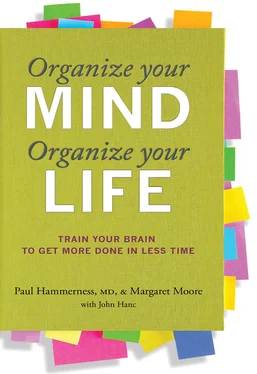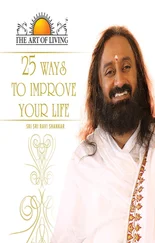PRAISE FOR ORGANIZE YOUR MIND, ORGANIZE YOUR LIFE
“A treasure trove of tips, tools and techniques, making it possible to stay mindful of your self-care priorities while navigating the challenging stresses of everyday life.”
—Pam Peeke, MD, MPH, FACP
Host, Discovery Health TV’s Could You Survive?
Author of New York Times bestseller Fit to Live
WebMD’s Lifestyle Expert
“Marvelous! This empowering collection of transformative, science-supported tools can help anyone change his or her life in healthier, happier directions. If you want a smart, straightforward guide to taming the crazy-making factors in your life and fulfilling more of your personal potential, this is it!”
—Pilar Gerasimo
Editor-in-Chief, Experience Life magazine
Senior Vice President, Education—Life Time Fitness
“Hammerness and Moore have translated the latest science in brain function into a few, highly effective skills that help us bring order and control in our lives. In a world where distractions are ever growing and taking new forms, this book offers key insights that will help us lead less stressful and more productive lives at work as well as at home.”
—Jon Ayers
Chairman, President & CEO, IDEXX Laboratories
“Together, Dr. Paul and Coach Meg offer hope. They show us what works and help us create a believable, workable plan to be our best in even the most challenging situations. This unique wellness coaching offers reasons, real-life strategies and results.”
—Ruth Ann Harnisch, President
The Harnisch Foundation
“Practical and very accessible, this book significantly empowers anyone’s ability to nimbly manage the massive amounts of information we all must deal with in an increasingly complex high-tech world.”
—Jeffrey M. Schwartz, MD
Research Psychiatrist, UCLA
Coauthor of You Are Not Your Brain and The Mind & the Brain
Organize Your Mind
Organize Your Life
Train Your Brain
to Get More Done in Less Time
Paul Hammerness, MD & Margaret Moore
with John Hanc
Introduction
CHAPTER 1: The Rules of Order/Dr. Hammerness
CHAPTER 2: A Change Will Do You Good/Coach Meg
CHAPTER 3: Rules of Order/Tame the Frenzy
CHAPTER 4: Rules of Order/Sustain Attention
CHAPTER 5: Rules of Order/Apply the Brakes
CHAPTER 6: Rules of Order/Mold Information
CHAPTER 7: Rules of Order/Shift Sets
CHAPTER 8: Rules of Order/Connect the Dots
CHAPTER 9: Staying on Top of a Fast-Changing World
APPENDIX 1: The Rules of Order At-A-Glance
APPENDIX 2: The Top 10 (Dis)organizational Complaints—and Our Solutions
Notes
References
Acknowledgments
About the Authors
HOW ORGANIZED ARE YOU?
(Please answer A, B or C.)
A. VERY ORGANIZED. My desk is neat, I never miss an appointment or a deadline, my friends are amazed, my co-workers are jealous and my boss loves me.
B. MODERATELY ORGANIZED. I manage to stay on top of things pretty well, but sometimes I feel overwhelmed, not sure what to do first, and I must admit that I’m a little jealous of my colleagues and my boss who seem more organized.
C. COMPLETELY DISORGANIZED. In fact, I’ll be lucky if I can remember where I parked my car. That’s assuming I don’t get a text or a phone call in the next two minutes, which will completely throw me off and…what was the question again?
If you answered A, B or C, this book is for you! In Organize Your Mind, Organize Your Life, we share with you the six key ways in which you can use “top-down organization” to get more done in a lot less time—and feel good about it.
By “top-down organization,” we mean brain science. As you will see, there are amazing new insights gleaned about the way our brain works to organize our thoughts, actions and emotions. Through hightech brain scans, or neuroimaging, we can now “see” the response of the brain to various situations. Here’s an exciting example of what scientists have found.
THE ORGANIZED BRAIN IN ACTION
In a 2008 study, subjects were shown a series of pleasant, unpleasant and neutral pictures while they were attempting the difficult task of keeping in check their emotional reactions. Through the use of hightech brain imaging or neuroimaging, researchers were able to observe the “thinking” regions of the subjects’ brains (including areas called the prefrontal cortex and the anterior cingulate cortex) managing the “emotion”-generating parts of the brain. It’s an intriguing new study that sheds light into the brain’s own built-in system of organization and regulation—one that strives for order, one that can “tamp down” (suppress) our emotions when necessary.
As we will show you, once you can better manage your emotions, you can then begin to harmonize and focus the various “thinking” parts of your brain, opening up a whole new world before you. You’re on your way to achieving a more organized, less stressful, more productive and, in many ways, more rewarding life. And—here’s the most exciting part—the features in the brain’s magnificent self-regulation system come “preloaded” in every functioning human mind; these features can be accessed, initialized and utilized to allow you to become better organized and to feel more on top of things.
You just have to know how to do it. That’s what this book will show you.
WHAT MAKES THIS ORGANIZATION BOOK DIFFERENT?
This is not a book meant to give you tips on how to rearrange your desk, to make lists or to set up a better system for keeping track of your appointments.
This is a prescriptive book that will help you better organize your life by better organizing your mind, by making some basic changes in the way you think about and deal with your work, your colleagues, your family and yourself on a day-to-day basis. As a result, you will become better focused, more attentive, less distracted and better able to adapt to new situations and changes that, in the past, might have overwhelmed you.
Organize Your Mind, Organize Your Life is organized differently than most self-help books. At its core is a unique partnership between a leading Harvard clinician-researcher and a leader in coaching for health and well-being—a collaboration that serves as a model for the future and can help make a big impact on readers like yourself. In a physician-coach partnership, a new concept in personal health, a Doctor of Medicine diagnoses the problem, explains what you need to do and plants the seeds for you to make the change. Then, a certified wellness coach guides you through implementation of the change.
Here is our team:
PAUL HAMMERNESS, MD, is an Assistant Professor of Psychiatry, Harvard Medical School; Assistant Psychiatrist, Department of Psychiatry, Massachusetts General Hospital; and Child and Adolescent Psychiatrist, Newton Wellesley Hospital. Dr. Hammerness has been involved in research on the brain and behavior for the past 10 years, with a focus on Attention Deficit Hyperactivity Disorder (ADHD). He has lectured on the topic locally, nationally and internationally to other physicians, mental health professionals, educators and families. In his clinical practice, Dr. Hammerness sees on a daily basis what a clinically “disorganized” mind looks like across the age spectrum, whether it’s an eight-year-old who is struggling in school due to inattention or a forty-eight-year-old professional woman whose life-long organizational problems are now affecting her work and family life. From research, and from witnessing the struggles of people with clinically “disorganized” or distracted brains, Dr. Hammerness shares his insights into what a well-ordered brain can do.
Читать дальше

![Джон Харгрейв - Mind Hacking [How to Change Your Mind for Good in 21 Days]](/books/404192/dzhon-hargrejv-mind-hacking-how-to-change-your-min-thumb.webp)










